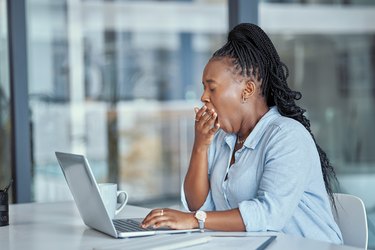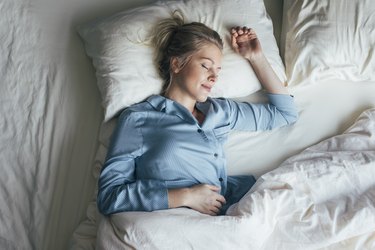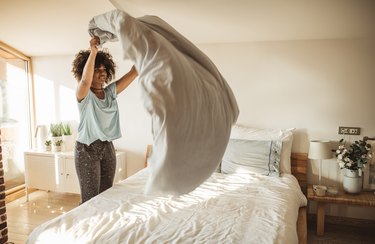
Many people wear lack of sleep like a badge of honor, taking pride in pulling an all-nighter or surviving on five hours a night.
But skipping sleep shouldn't be valued as a sign of strength or productivity. Quality sleep is crucial for overall health and well-being. Not getting enough sleep can have harmful effects.
Video of the Day
Video of the Day
Sleep deprivation — or not getting enough sleep each night — is incredibly common. More than one third of American adults report sleeping fewer than seven hours a day, according to the American Thoracic Society. (The average recommended sleep per night is seven to nine hours for most adults.)
And while certain symptoms of sleep deprivation — like feeling tired during the day — are obvious, others are harder to notice.
Here, Emerson Wickwire, PhD, professor and section head of sleep medicine at the University of Maryland School of Medicine, shares the sneaky signs of sleep deprivation to look out for, plus what you can do to get better shut-eye.
What Causes Sleep Deprivation?
There are many causes of sleep deprivation. Some of the most common include, per Cedars Sinai:
- Sleep disorders: These include insomnia, sleep apnea, narcolepsy and restless legs syndrome.
- Aging: Sleep changes with age — typically, older people sleep lightly and for shorter periods, due to chronic health problems and/or side effects of certain medications.
- Illness: Sleep deprivation is more prevalent among people with certain medical problems including depression, schizophrenia, chronic pain syndrome, cancer, stroke and Alzheimer's disease
- Sudden disruptions or shifts in one's sleep schedule: This includes jet lag, a new baby or a recent change in work hours.
Practicing poor sleep hygiene is another fundamental factor that can zap your zzzs, according to the American Thoracic Society.
4 Sneaky Signs of Sleep Deprivation
Sudden bouts of sleepiness and daytime drowsiness are telltale signs of sleep deprivation. But there are also more subtle effects of sleep deprivation that you should learn to spot, too.
1. Cognitive Impairment
"Decades of clinical, experimental and epidemiologic evidence demonstrates that sleep is essential for cognitive function," Wickwire says.
That means, sleep deprivation has several negative effects on the brain. For instance, "not getting enough sleep, or quality sleep, worsens brain function, including our ability to remember, concentrate and make good decisions," Wickwire says.
"More recent data even suggests that chronic sleep deprivation increases the risk for cognitive decline as we age, including Alzheimer's disease," he adds.
Indeed, an April 2021 study in Nature Communications found that middle-aged people (those in their 50s and 60s) who slept six hours or less per night had a 30 percent higher risk of developing dementia later in life compared to those who slept a normal seven hours each night.
Warning
Impaired cognition caused by sleep deprivation can also be dangerous.
Just one less hour of sleep can impact your concentration and reaction time the next day, which can contribute to work accidents and car crashes, according to the American Thoracic Society.
In fact, the National Highway Traffic Safety Administration reports that driving while sleep deprived results in about 100,000 car accidents (and 1,500 deaths) each year, according to the Cleveland Clinic. So, if you start to feel drowsy while driving, pull over ASAP and rest by the side of the road.
2. Weight Gain
If you're putting on pounds without explanation, lack of sleep may be to blame.
When you don't get quality shut-eye, your hormones are impacted, Wickwire says. Sleep deprivation messes with the hormones that regulate appetite and glucose breakdown, which can affect weight gain, according to the American Thoracic Society.
And it only takes a tiny disruption in your daily sleep routine to feel the effects. "With as little as one night of partial sleep deprivation, we feel more hungry, less full and [have] more cravings for calorie-dense foods that are high in sugars and fats," Wickwire says.
Being sleep deprived could also make you less likely to be physically active during the day, according to the Harvard T.H. Chan School of Public Health. This could lead to weight gain over the long term.
What's more, sleep deprivation can also alter how your body stores fat from food, according to a September 2019 study in the Journal of Lipid Research. Researchers discovered that people who experienced just four nights of inadequate sleep retained less fat in their bloodstreams after a meal.
In other words, when you are sleep-deprived, your body stores more fat. And this could have consequences for the number on the scale.
3. Changes in Mood
You've likely heard the saying, "Someone woke up on the wrong side of the bed." This expression — used to describe when a person's grumpy or in a sour mood — holds some truth.
That's because "sleep is essential to health, including mental health," Wickwire says. Indeed, sleep plays a pivotal role in certain brain functions that regulate emotions and behaviors, according to Columbia University Department of Psychiatry.
So when we lack it, we're more likely to experience mood swings or feel depressed, anxious or irritable. In fact, research has shown that unsatisfactory shut-eye can ramp up negative emotional responses, reduce our ability to cope with stressors (even minor ones) and diminish positive emotions, per Columbia University Department of Psychiatry.
"And, when we feel down or stressed, we tend to sleep even worse, so the problem perpetuates and can create a vicious cycle," Wickwire says.
4. Reduced Ability to Fight Off Infections
Sleep deprivation might also make you sick. That's because during sleep, your body recharges and repairs itself, according to the American Thoracic Society.
Lack of sleep affects your immune system. During sleep, your body produces an increased number of cytokines (proteins) that create an inflammatory response, which can help you recover when sick, fighting infection or injured, per the Mayo Clinic.
A September 2015 study in Sleep also found that folks who sleep fewer than six hours per night are more susceptible to getting sick with the common cold. In the same way, sleep deprivation can also affect your body's ability to build ample antibody response to vaccinations.
"Given the importance of COVID-19 and other vaccines, many people are surprised to know that not getting a good night's sleep can make vaccines less effective," Wickwire says. There's science to back that up: A June 2022 systematic review in the Yale Journal of Biology and Medicine concluded that a good night's sleep could support the immune response after vaccination.
Not only can inadequate sleep interfere with your immune system’s capacity to fend off infection in the short term, but a chronic lack of sleep is also linked to long-term health problems such as heart disease, kidney disease, high blood pressure, diabetes, stroke and obesity according to the National Heart, Lung, and Blood Institute.
When to See a Doctor About Sleep Deprivation
If you're experiencing daytime drowsiness along with any of the above symptoms, consult with your doctor who may refer you to a sleep specialist. To assist in the diagnosis, write a sleep diary for a few weeks to help you keep track of your sleep patterns.
Tip
Take special care to note the following in your sleep diary, per the American Thoracic Society:
- When you get into and out of bed each day and any naps you take
- How much caffeine, alcohol or nicotine you consume daily
- Any over-the-counter medications, herbals or supplements you take each day
Monitoring your sleep habits may help a sleep specialist better evaluate and assess your situation. In some cases, they may even suggest a sleep study — which examines your breathing, heart rate and other vital signs while you sleep — to rule out (or diagnose) an underlying disorder like sleep apnea, according to Cedars Sinai.
How Is Sleep Deprivation Treated?
Though obvious, the only way to remedy sleep deprivation is to log more restful hours in bed.
Still, treatment for sleep deprivation depends on what's disrupting your ability to drift off and stay asleep. Once sleep disorders have been ruled out, poor sleep hygiene (i.e., subpar sleep habits like going to bed late) is often the source of people's sleep troubles.
"In today's busy world, it can be difficult to prioritize sleep in the midst of our busy lives, but the simple fact is that your brain and body will thank you for it," Wickwire says.
Here are some healthy habits to start forming for better sleep, per the Cleveland Clinic:
- Stick to a sleep schedule: Go to sleep and wake up around the same time every day, even on weekends and vacations.
- Create a good sleep environment: Turn down the lights, avoid loud sounds and keep the room at a comfortable temperature.
- Exercise every day: Stay active but try to avoid exercising during the few hours right before bed.
- Relax before bed: Take a warm bath, read or do another relaxing activity like meditation.
- Don't consume caffeine, nicotine and alcohol late in the day: These substances can interfere with your ability to fall and stay asleep.
- Nix daytime napping: A short nap (less than 30 minutes) is OK if you're very sleepy. But try to avoid naps after 3 p.m.
- Avoid electronics right before bed: Electronics, such as your phone or tablet, can interfere with your body's production of melatonin, a hormone that helps you feel tired.
- American Thoracic Society: “What Is Sleep Deprivation?”
- Nature Communications: “Association of sleep duration in middle and old age with incidence of dementia”
- Cleveland Clinic: “Sleep Basics”
- Journal of Lipid Research: "Four Nights of Sleep Restriction Suppress the Postprandial Lipemic Response and Decrease Satiety"
- Columbia University Department of Psychiatry: “How Sleep Deprivation Impacts Mental Health”
- Sleep: “Behaviorally Assessed Sleep and Susceptibility to the Common Cold”
- Yale Journal of Biology and Medicine: “Sufficient Sleep, Time of Vaccination, and Vaccine Efficacy: A Systematic Review of the Current Evidence and a Proposal for COVID-19 Vaccination”
- National Heart, Lung, and Blood Institute: “What Are Sleep Deprivation and Deficiency?”
- Cedars Sinai: “Sleep Deprivation”
- The Mayo Clinic: "Lack of Sleep: Can it Make You Sick?"
Is this an emergency? If you are experiencing serious medical symptoms, please see the National Library of Medicine’s list of signs you need emergency medical attention or call 911.


